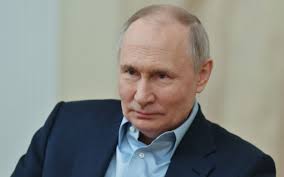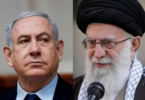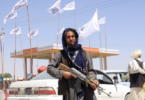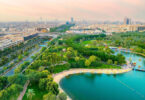Janet Daley
Vladimir Putin got to tell his side of the story last week. It was, of course, the precise opposite of what everybody in the West has been led to believe. Peace-loving Russia was the victim of a conspiracy by imperial forces which took advantage of its weakness after the Soviet Union collapsed. But the Communist era was itself a treachery against Mother Russia, whose historic identity had been betrayed by the Bolshevik decision to create separate republics out of what had been Russian territory.
All of this infamy and abandonment somehow justifies the invasion of Ukraine which is now somehow promoting Nazism (even though its leader, as Putin himself noted, is Jewish) and being courted by Nato. It was bizarre. Somehow, the Russian state as it existed in the 11th century was evidence for the injustice that now prevailed in a world which refused to acknowledge his country’s rightful claim to the ancient Russian homelands. But woven into this mythic narrative were more recent – and clearly personal – examples of the rejection of Putin’s peace-loving Russia by the American deep state, which had prohibited sympathetic US presidents from achieving any fraternal bonds with his emerging country. The overriding theme of blood-and-soil nationalism was undisguised and horrendously familiar: this could have been Germany demanding the right to reclaim the Sudetenland. But, in Putin’s fable, it was Ukraine that was run by Nazis. Perhaps none of this should be startling. Apart from the visceral shock of seeing a seemingly sane man utter such things, it has been Russia’s public stance since the annexation of Crimea in 2014. The only practical question could be, what made you decide to go further into Ukraine after that initial success? (To which the honest answer would be that, as the West did not raise a finger to protect Crimea, we thought we had an open door.)
But perhaps the very oddest thing about this is that the population of Russia is buying wholesale a weird blend of mystic religious destiny and rapacious capitalism, alongside a war which is becoming very expensive in blood and treasure. Within moments of Putin expounding on his nation’s sacred embodiment of the Eastern Church, he was proclaiming its triumph over Western Europe in economic growth. You might expect that this blend of archaic, almost superstitious, religious reverence with ultramodern market competitiveness would strike most educated Russians as questionable. Apparently not. We have Russian friends (including some who have spent a good deal of time in the West) who accept with unalloyed faith and enthusiasm, Putin’s particular blend of theocratic statehood and ruthless pursuit of profit. The liars and deceivers are all – they believe – in the West. Mother Russia is having a glorious rebirth and is now more prosperous than its Western rivals whose attacks are motivated by gratuitous spite. They ignore the most fundamental fact of that apparent economic miracle – that it depends on the sale of gas and oil which are Russia’s most marketable commodities – and they disregard entirely the demographic doom toward which its shrinking, unhealthy population is heading. (Average life expectancy is roughly ten years lower than in Western Europe. Alcoholism and its consequences are rampant.) But the educated professional classes of Russia living in Moscow and St Petersburg are largely sheltered from this hopelessness and despair – not unlike our own dear urban elites here in Britain. Their young men are not being conscripted for Putin’s crusade in Ukraine and they are enjoying the benefits of a consumer society for the first time in the modern era. They tell us proudly that they have beaten the West at its own game in the global market economy. Warnings have little effect because this is a nation of novice capitalists: they are unfamiliar with the cycles and volatility which are inherent in the free market system. Those downturns and recoveries to which we are accustomed inevitably afflict all non-command economies. All it would require to bring an end to Russia’s new prosperity is for potential competitors in the West to decide that their self-denying ordinance on the production of oil and gas had to end. (The US is already a net exporter of energy.) Those happy Russians who believe their wealth and bourgeois comforts are permanently secure seem oblivious to the fact that they are dependent on political decisions made by foreign governments. That is what it means to be a player in the global game.
Alarming as well is their reliance on what Russia’s leaders believe to be China’s inevitable emergence as the new all-conquering commercial power. Putin referred reverentially to his friend Xi Jinping’s stupendous success in making China the dominant economy of the new world order. He seemed oblivious to the crisis which is now undermining Chinese growth brought about by its own demographics and, ironically, by a debt problem remarkably like the one that nearly took Western capitalism down. The Chinese Belt and Road loan programme which was designed to mire the developing world in unpayable indebtedness has turned out to be similar in its consequences to the subprime mortgage scheme in the US. China has now loaned out a lot of money which it will never get back. There is a recurrent theme that runs in the Putin interview and comments we hear from our interlocutors in Russia: the West is finished, broken by its own hubris and complacency.
This may sound familiar to you. Indeed, some of the words we hear repeated back to us from those sublimely confident Russians are clearly borrowed from the apocalyptic commentary which has become commonplace in our own discourse. Every piece of news analysis which declares the death of the Western way of life is doing Putin’s work for him. Perhaps it would be helpful to ask why there are not hordes of people risking their lives to get into Russia and China. The West’s self-loathing is not only having a demoralising effect on its own people: it is feeding the delusion of a dangerous enemy.
The Telegraph







